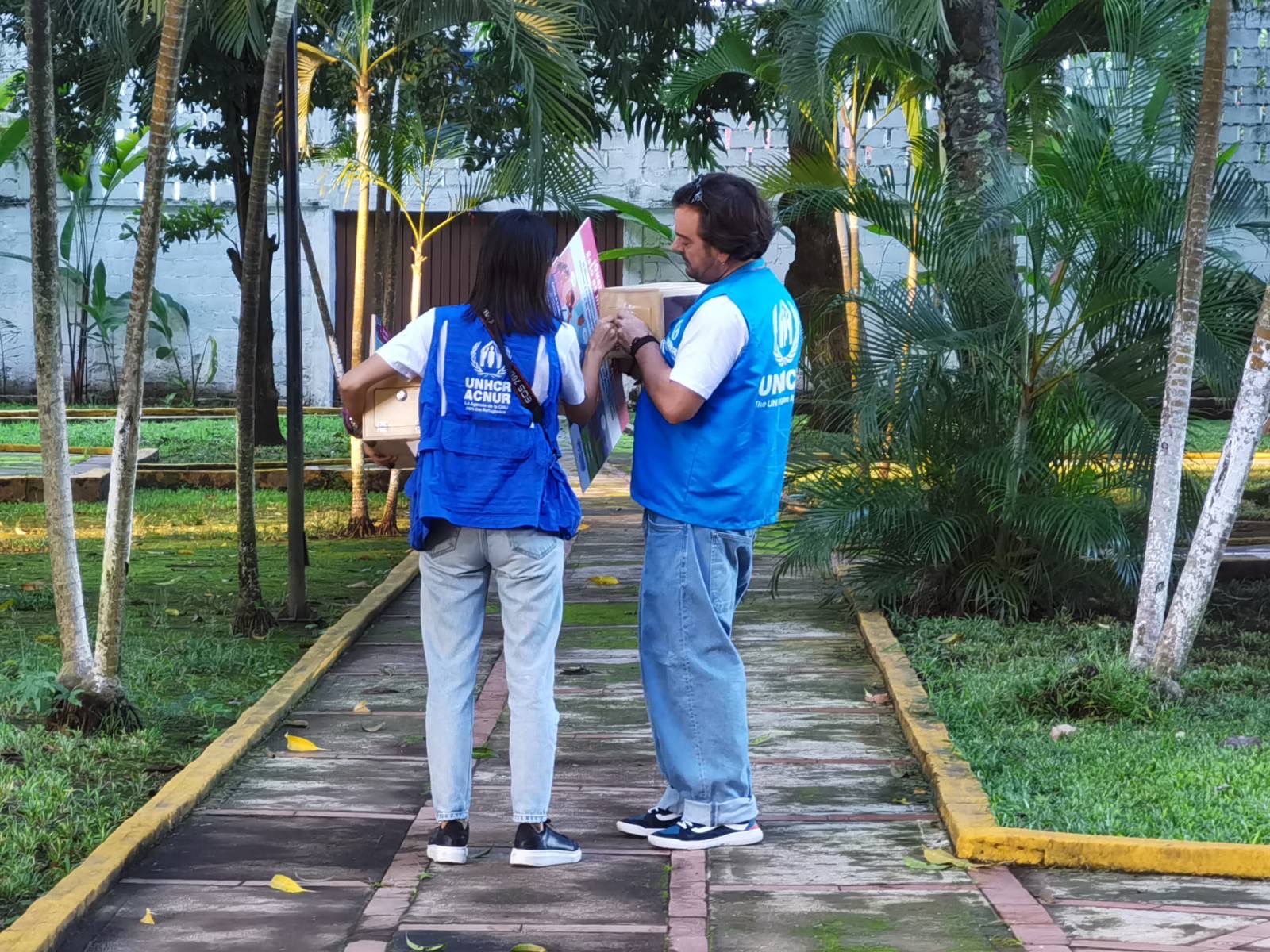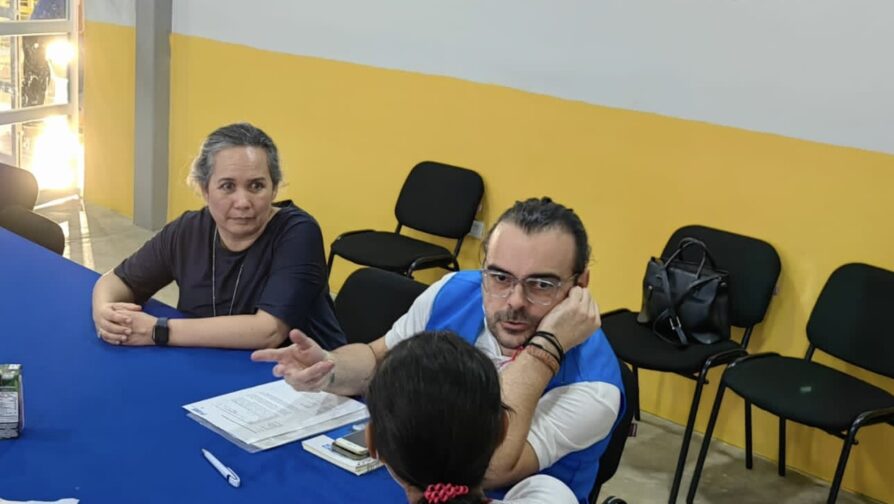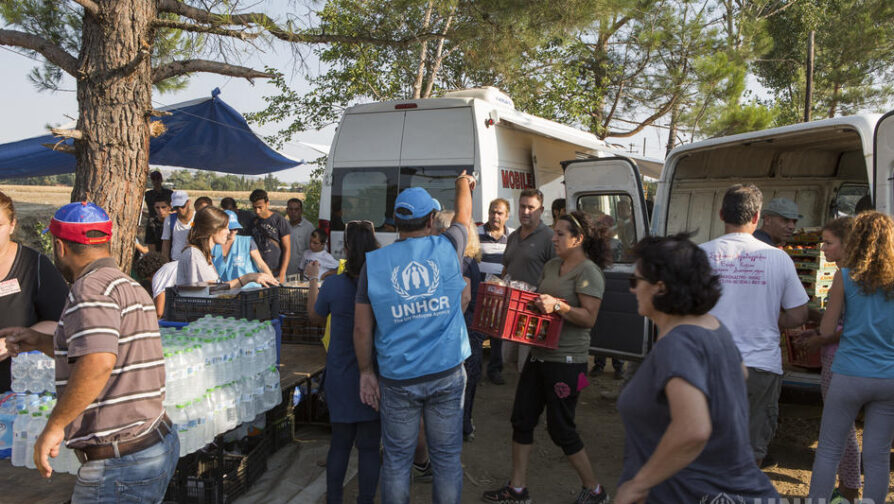Associate Field Officer

Setting up UNHCR complaint boxes during a participatory assessment exercise in 2022. © UNHCR Mexico/ Carlos Colmenares
“Solidarity is a stance in life that takes shape through tangible actions benefitting the society as a whole. This makes us active members of a society, with respect for human rights”.
How would you describe your work?
Ι am currently leading a dedicated team of colleagues based in Tapachula, southern Mexico. Our work revolves around promptly addressing the most urgent needs of people on the move in the area, that may be in need of international protection. To be more precise, we provide information to newly arrived persons in the country, identify and refer vulnerable cases and we also monitor the situation and conditions at the borders, where we maintain weekly presence.
In our daily work, we also engage directly with refugees in urban areas and cooperate with UNHCR partners who host refugees and asylum seekers in Tapachula. With a view to better understand refugees’ unique needs and adapt our activities accordingly, we regularly hold group discussions for refugees to express their thoughts, emotions and ideas.
What made you decide to become a humanitarian worker?
The need to work with refugees came very naturally during my traineeship as a lawyer and my involvement in human rights issues. It all started with the case of a refugee from Iran who was forced to flee his country in 2010 due to his political activity. This case was referred to me, with a note to contact UNHCR for more information, which I did in order to understand the full context. This initial communication with the small protection team back then at the National UNHCR Office in Greece was the beginning of a long journey that was meant to be my professional life until today. It was very rewarding to find out that the Iranian refugee had been provided with a status, in a period when the recognition rate in Greece was less than 1%. A few years later, in fact, he became a dear colleague within UNHCR.

Interviewing a transgender woman at the shelter-partner of UNHCR in Tapachula. © UNHCR Mexico/Angelica Gonzales
Which is the greatest challenge you have faced working far from Greece?
One of the greatest challenges I have encountered abroad has been the lack of a supportive environment, such as family and close friends. With a nine-hour time difference from Greece, communication with loved ones back home was very difficult, especially at the beginning, not to mention contacting Greek services that required setting my alarm clock in the middle of the night! Adapting to the tropical climate brought its own set of challenges -the long rainy and dry seasons, the tropical deceases, the frequent food poisoning due to high temperatures. Yet, I managed to adapt relatively easily and learned to take my precautions.
However, what I will never forget are the tragic incidents that shadowed my previous appointment in Lebanon, during 2019-2020. At that time, I felt that my personal physical and mental health could be compromised. At first, the serious political turmoil that led to the resignation of the government and the daily protests on the streets seriously limited our mobility around Beirut and at our office. Then, the COVID-19 pandemic followed in a country where public structures were already fragile. Just a few months later, a tremendous blast at the port of Beirut caused more than 200 deaths, left hundreds missing and severely damaged a large part of the city, breaking down houses and vehicles. On 4 August 2020, we survived simply because we were luckier than others.
Please describe an experience you had working in the field, that you will never forget.
A truly unforgettable experience that fills me with gratitude was my nine-month tenure as interim Head of Field Unit in Eidomeni, a village at the Greek borders with North Macedonia, during the first phase of the 2015-2016 emergency. Alongside a small team and in collaboration with other organizations and local authorities, we provided information and progressively more services to respond to the most urgent needs of refugees from Syria and other countries. In less than a month, we set up large tents, sanitary facilities, medical care, safe spaces for mothers with children, women and girls and meals were regularly served. Our focus was on keeping families together and ensuring that children would not be left alone and persons with disabilities unattended. A few months later, working day and night in a very volatile environment, the borders in the Balkan route closed, leaving thousands stranded against a barbed wire. People despaired and the facilities were engulfed in flames. We had to urgently evacuate the area but returned in less than 48 hours to support the transfer of people to new facilities created by the Greek authorities around the country, closing down the “camp” in Eidomeni.

Alexandros Voulgaris (centre) and other UNHCR staff together with a group of Greek volunteers from the nearby city of Kilkis prepare to hand out water and food to refugees and migrants arriving in Eidomeni, August 2015. © UNHCR/Ivor Prickett
What does solidarity mean to you and how could we foster it further?
As a genuine supporter of the Kantian theory on solidarity, a subject I also explored in my master’s dissertation in political science, I strongly believe that beyond the international, regional, or national legal instruments that are underpinned by solidarity, there is a universal ethical principle requiring respect for the humanity of others and adherence to rules that hold for everyone. Solidarity is a stance in life that takes shape through tangible actions benefitting the society as a whole. This makes us active members of a society, with respect for human rights. While this impact may not be immediately visible, its true added value is that future generations may embrace solidarity as an innate value, eliminating the need to struggle for it.
Share on Facebook Share on Twitter